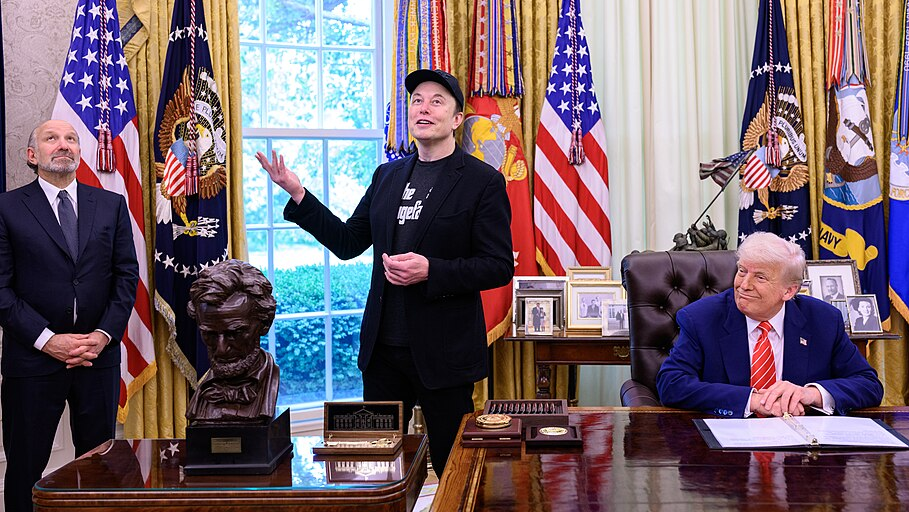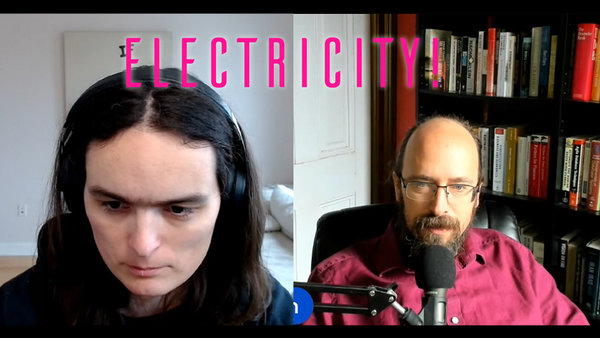Billionaires Are Hoarding Power, Not Money
Billionaire money has become a source of wildly distorted political power that allows a few men with extremist views to wreak havoc on the rest of us.

In the heyday of support for Sen. Bernie Sanders and democratic socialism, the idea that Americans couldn’t have nice things because billionaires were hoarding all the wealth was a boilerplate bromide. “We are the 99 percent,” went the rallying cry, and if that we just took some of the money the 1 percent was hoarding, we could easily pay for new broad-based social programs, such as Medicare for All, a universal basic income, free college—take your pick.
In 2018, it was estimated that Medicare for All would cost $32 trillion over a decade—about $41 trillion in today’s dollars. The total net worth of all billionaires in the United States is about $6 trillion, give or take. In other words, if Americans confiscated every dollar from every billionaire, that would pay for about a year and a half of Medicare for All. Then we’d be out of cash.
The problem with billionaires isn’t that they’re hoarding money that would otherwise pay for a Scandinavian social utopia. It’s that their money has become a source of wildly distorted political power that allows a few men with extremist views to wreak havoc on the rest of us.
In reality, of course, taxes on billionaires are never perfectly efficient or maximally confiscatory. Sen. Elizabeth Warren’s 2020 proposal was for a 6 percent yearly tax on fortunes over a billion dollars. She estimated that this would raise $3.75 trillion over 10 years.
You can run the numbers yourself for universal basic income or whatever other social program you have in mind. Billionaires have a lot of money, yes. But the United States is an enormous, prosperous country, and most universal social programs would necessarily involve substantial taxes on the middle class. To fund its generous welfare state, Denmark collects 43.4 percent of its GDP in taxes per year. The United States collects a scant 25.2 percent. Making up the difference would require broad-based tax increases amounting to $5.05 trillion per year. The trade-off might well be worth it—but confiscating billionaire wealth is not a magic bullet to solve U.S. budget problems.
Does this mean that the United States shouldn’t aggressively tax billionaires? Absolutely not. Let’s take a tour through the events from back in the first few months of the year. After taking office, President Donald Trump stepped aside and allowed Elon Musk and the newly created Department of Government Efficiency to run riot in the federal bureaucracy, effectively shuttering entire agencies.
To pick just one, the U.S. Agency for International Development cuts alone could result in the deaths of millions of people over the coming years from malaria, tuberculosis, AIDS, and other diseases.
Even in the case of Trump’s "Liberation Day" tariffs that rocked markets, the bizarre formula used to calculate the initial tariff rates appears to have been generated not by economic analysts but by ChatGPT—another symptom of Musk’s presence in the Trump government. This obsession with artificial intelligence is likewise behind the drive to replace the Social Security Administration’s highly reliable COBOL systems with what is likely AI-generated code, all in search of nonexistent fraud. These bizarre choices have only increased the chaos and instability that is currently ravaging the world economy.
How did we get here? Everyone knows the answer: In 2024, Musk spent a negligible fraction of his vast fortune, now some $455 billion, to effectively buy a government position.
In the 2024 campaign, he spent more than $290 million supporting Trump and other Republicans. In the closing critical months, he became almost the entirety of Trump’s financing. This is equivalent to the median American spending about $112.18, give or take a few pennies.
Musk, of course, is only the latest outbreak of a long-standing problem. Before Musk, Harlan Crow effectively bought a Supreme Court justice. The Koch brothers long drove extremist politics through a steady stream of wingnut welfare. Jeff Bezos purchased the Washington Post and now sets its editorial policy at will. And of course Musk’s purchase of Twitter—and well-known manipulation of its algorithms to drive his preferred discourses, including pro-Trump sentiment—cannot be discounted.
Meanwhile, Trump has stocked his cabinet with billionaires. Setting aside Musk and his dubiously-legal position, there are at least ten billionaires at the highest levels of government, from Secretary of Education Linda McMahon to Secretary of the Treasury Scott Bessent to Secretary of Commerce Howard Lutnick. And of course Trump himself has used the powers of his office to dramatically increase the billions of himself and his family. This is an oligarchy in all but name.
Enough. If your government is for sale to any billionaire willing to pay, you do not have a democracy. Democracy, as we understand it, began as a rebellion against the arbitrary power of kings. But arbitrary power is arbitrary power, whether it belongs to a king of England or a prince of Silicon Valley.
It was once thought that economic inequality could be walled off from political inequality. “Get money out of politics” has been the rallying cry of campaign finance reform for decades. But as the Supreme Court recognized, money and speech are inextricable. As the old saying goes, money can be exchanged for goods and services.
This is not entirely a bad thing—it is an essential feature of liberal societies that exclusion in the political sphere can be responded to by countermobilization in other spheres, such as economics or culture. But it does mean that overweening inequalities of power in one domain inherently threaten liberal equality in others. In other words, just as checks on political power are necessary, so are checks on economic power.
While other countries are willing to more aggressively limit free speech, including but not limited to campaign finance restrictions, the First Amendment makes this difficult to impossible in the United States. Instead, Americans must confront the problem of economic inequality and the dire power differentials it enables more directly: by taxing billionaires.
And the thing is, taxing billionaires isn’t even that bad for billionaires. At that level of wealth, there is nothing material left to buy. The second billion goes not into more consumption but simply purchasing more assets. The marginal value of each new dollar of wealth diminishes almost to zero, except perhaps as a way of keeping score with other billionaires.
Even if most billionaires never engage in conduct as egregious as Musk’s, the possibility remains, both as a danger we must protect against—and as a threat hanging over the heads of elected politicians and influencing their actions: Don’t ingress on wealth inequality too greatly, or someone might pull an Elon on you. This is not tolerable in a free society.
Billionaires are dangerous. We should tax them until they aren’t.
Featured image is "President Donald Trump participates in a press conference with departing DOGE adviser Elon Musk," Molly Riley 2025. Cropped.





